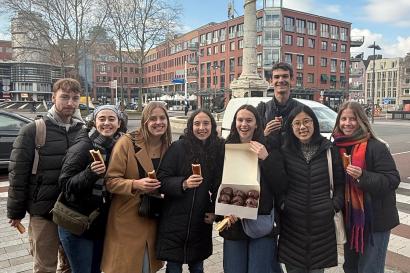In my life and especially in travel, getting organized has been essential to being successful. During the pre-departure process, there has been nothing more helpful than preparing a to do list. To do lists are great organization tools, particularly for when one has many things that must be completed in a set amount. They are great tools for time management, preparation and getting stuff done, in general. In preparing to study abroad, creating a to do list and focusing on tackling particularly hard tasks has been critical to my pre-departure process. Before creating one, I felt lost and overwhelmed by the prospect of traveling abroad, and it was very hard to figure out what I needed, what to focus on and what to pack. Creating a to do list grounded me and gave me a tangible list of things that needed to be accomplished before going serving as a guide throughout the pre departure process. Below are some tips and tricks into creating your pre-departure to do list.
Ask Yourself, What do you Need?
The first step, and arguably the hardest step for me, was figuring out what the world I would need while traveling abroad. When traveling to a place you’ve never been to before, its hard to know what to pack, what to bring and what to expect. Because of this, before formulating your to do list, ask yourself:
What items do I use on daily basis?
What items would I need in order to be successful abroad?
WIll I need this where I am staying?
Can I be okay abroad and leave this item at home?
Some questions cannot be answered without a bit of research. Researching your housing accommodations, the weather at your place of destination, and considering what activities you plan on engaging in is a helpful start. Check out IES Abroad’s pre-departure information for your program for further guidance as well.
Organize and prioritize
After compiling a full list of things to do, set your priorities and organize a list. After creating a full checklist of items to be collected and things that need to be done, I set different list items into categories. Splitting your travel to do list into parts like this can make the process easier to tackle and provide a clearer idea of what types of tasks need to be completed or what types of items need to be collected and packed for your travels abroad. The categories you choose for your travel to do list can be can be anything. To do lists can be organized by activity, deadline, type of task or any other number of topics. In addition to this, signaling priority items on your to do list in order of importance, deadline or time the task will take.
Don’t over do it; remember what matter to you
Although it may seem like there is an endless amount of things to do, there is a point where it’s important to stop. Avoid overdoing things. Instead balance the time you spend rushing around preparing for your trip with down time. In the end, overdoing it can be just as detrimental as undergoing it, as overpacking, stressing yourself out and exhausting yourself before the trip can also make a trip hard. Even before being organized and getting things done in preparing to go abroad, spending time doing the things that mattered to me has been the most important thing I’ve done to prepare for my time abroad. This includes spending time taking care of myself, taking time for my family and making time to see my friends and loved ones who I won’t see while I’m abroad. Finding this balance, while hard, is important because I think I would have really regretted not taking the time to do what I felt like was important because I was afraid of not getting everything on my to do list done. Don’t be afraid to ask for help from friends and family for help or invite them along to help you as you tackle that things you need to do.

Gillian Giles
<p>I’m 21 years old and just starting to explore the world outside the United States! Currently I attend Sarah Lawrence College as a junior studying Sociology. I’ve always enjoyed a good book, story or adventure and plan on collecting many new stories while I’m abroad. I cherish empathy, kindness and good listening. I’ve experimented with art, style and writing and am always looking for new ways to express and explore myself. I firmly believe that understanding yourself also means understanding your context and the world around you and I am looking to continuously do that through travel. As an IES correspondent I hope to provide content that both tells a story about the places I’ve been and show chases a my perspective as someone whose black, LGBTQ and disabled.</p>






